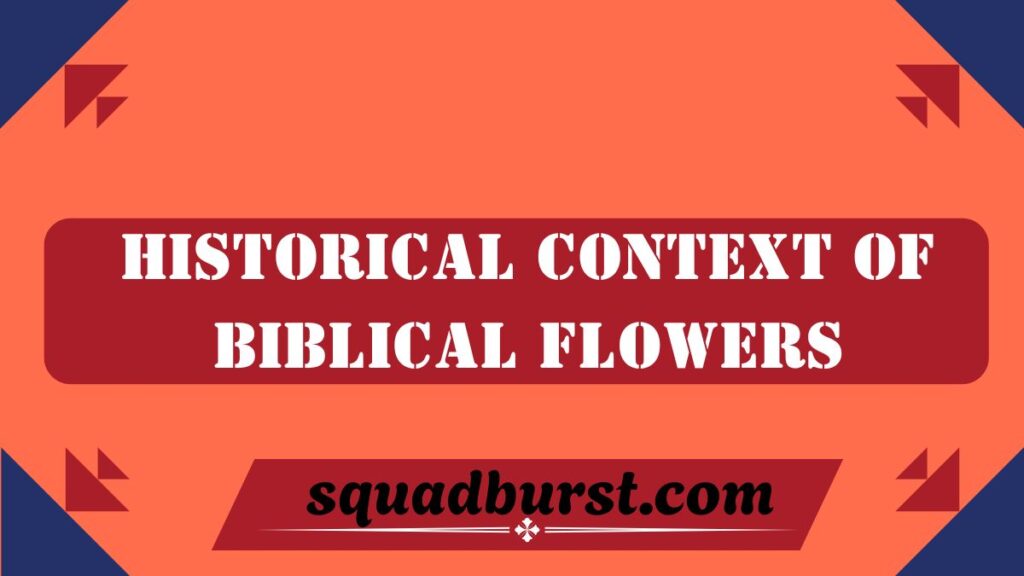Bible Verses About Flowers: God’s Beauty in Nature reveal the deep spiritual lessons hidden within creation. Flowers are more than delicate blooms; in Scripture, they symbolize life’s fragility, divine care, and the eternal promises of God. Each verse that speaks of flowers points to God’s artistry in nature, reflecting His wisdom, creativity, and love for all living things.
Just as petals unfold in vibrant colors, these verses open hearts to a greater awareness of God’s presence. The beauty of flowers in the Bible serves as a poetic reminder that life, though fleeting, carries profound meaning. Readers find inspiration and comfort in knowing that God clothes the earth with beauty and will provide the same care for His people.
Through Bible verses about flowers, one discovers not only visual splendor but also timeless truths. They highlight faith, renewal, joy, and the glory of God revealed in creation, inviting believers to see His hand in every blossom.
The Divine Artistry Behind Every Petal
Nature serves as God’s open book. Every bloom tells a story of intentional design and purposeful beauty. When we examine biblical meaning of flowers, we discover layers of spiritual significance woven into petals and stems.
The symbolism of flowers in the Bible extends far beyond decoration. These living testimonies reveal God’s character – His provision, creativity, and eternal promises. Each blossom becomes a sermon without words.
Flowers Show God’s Care for His Creation

Matthew 6:28-30 – The Ultimate Fashion Statement
“And why do you worry about clothes? See how the flowers of the field grow. They do not labor or spin. Yet I tell you that not even Solomon in all his splendor was dressed like one of these. If that is how God clothes the grass of the field, which is here today and tomorrow is thrown into the fire, will he not much more clothe you—you of little faith?”
Jesus points to wildflowers grow as living proof of divine provision. These delicate blooms don’t stress about their appearance. They simply exist in their God-given beauty.
Solomon in all his splendor couldn’t match a single flower‘s natural elegance. The richest king in history, with unlimited resources, fell short of nature’s simple perfection. This comparison isn’t about fashion – it’s about faith and trust in God.
Key Lessons from Field Flowers
The flowers as God’s care demonstrate several vital principles:
- Effortless beauty: Flowers don’t strive for attractiveness
- Divine provision: God supplies their every need
- Temporary yet precious: Brief life doesn’t diminish their value
- Natural testimony: Creation speaks of its Creator’s character
Consider how anxiety melts when we truly grasp this truth. If God carefully tends each meadow bloom, won’t He provide for His beloved children?
Modern Application Table
| Flower’s Example | Human Application | Biblical Promise |
|---|---|---|
| Grows without worry | Trust God’s provision | Matthew 6:26 |
| Beautiful without effort | Rest in God’s design | Psalm 139:14 |
| Blooms in season | Wait on God’s timing | Ecclesiastes 3:1 |
| Receives daily care | Expect daily mercies | Lamentations 3:23 |
Flowers Represent the Shortness of Life

Psalm 103:15-16 – The Reality Check We Need
“The life of mortals is like grass, they flourish like a flower of the field; the wind blows over it and it is gone, and its place remembers it no more.”
This verse delivers sobering truth about temporary life. Human existence mirrors the fleeting nature of life found in delicate petals. Morning dew glistens on fresh blooms. By evening, the same flowers may wither.
Flourish like a flower captures both beauty and brevity. We experience seasons of vibrant growth followed by inevitable decline. This isn’t pessimistic – it’s realistic perspective leading to wisdom.
Isaiah 40:8 – What Truly Lasts
“The grass withers and the flowers fall, but the word of our God endures forever.”
Grass withers, flowers fall – but God’s Word stands eternal. This contrast between temporal beauty and eternal things reshapes our priorities completely.
Physical beauty fades. Achievements crumble. Relationships end. Yet divine promises remain unshakeable across generations.
Mortality Lessons from Garden Wisdom
Understanding life’s brevity through floral metaphors teaches:
Perspective Shifts:
- Appreciate present moments fully
- Invest in eternal things over temporary pleasures
- Value relationships above possessions
- Seek lasting impact through godly living
Time Management:
- Prioritize what truly matters
- Make peace with others quickly
- Share faith while opportunity exists
- Create meaningful legacies
The shortness of life scripture doesn’t discourage us. Instead, it motivates intentional living focused on eternal values.
Flowers Symbolize Renewal and Joy-

Song of Solomon 2:12 – Spring’s Sweet Symphony
“Flowers appear on the earth; the season of singing has come, the sound of doves is heard in our land.”
After winter’s harsh grip loosens, flowers symbolize hope and fresh beginnings. The season of singing arrives with blooming meadows and fragrant gardens.
This verse connects floral beauty with joyful celebration. Nature’s renewal mirrors spiritual revival in believers’ hearts. Joy in God’s love bursts forth like spring’s first crocus breaking through snow.
Isaiah 35:1-2 – Desert Transformations
“The wilderness and the parched land will be glad; the desert will rejoice and blossom. Like the crocus, it will burst into bloom; it will rejoice greatly and shout for joy.”
Even barren wastelands experience spiritual renewal when God intervenes. Parched land will be glad as desert will rejoice with unexpected blooms. The wilderness will blossom beyond imagination.
This prophecy speaks of both literal and spiritual transformation. Hearts resembling spiritual deserts can flourish in faith when touched by divine grace.
Renewal Patterns in Scripture
| Desert Condition | God’s Intervention | Beautiful Result |
|---|---|---|
| Spiritual dryness | Holy Spirit’s work | Spiritual growth |
| Broken relationships | Forgiveness power | Restored fellowship |
| Lost hope | God’s promises | Hope and new beginnings |
| Life’s wilderness | Divine guidance | Purpose and direction |
Case Study: From Wasteland to Garden
Consider Israel’s prophetic future described in Isaiah. The nation faced exile, destruction, and spiritual barrenness. Yet God promised restoration more beautiful than original creation.
Modern believers experience similar cycles. Life‘s harsh seasons – loss, failure, disappointment – can feel like permanent winter. But flowers as signs of joy remind us that spring always follows winter in God’s economy.
Practical renewal signs:
- Peace replacing anxiety
- Joy emerging from sorrow
- Hope conquering despair
- Love overcoming bitterness
Flowers as a Sign of God’s Glory

Luke 12:27 – Nature’s Fashion Show
“Consider how the wild lilies grow. They do not labor or spin. Yet I tell you, not even Solomon in all his splendor was dressed like one of these.”
Wildflowers grow without human effort yet display God’s glory in creation more magnificently than royal robes. Their natural elegance surpasses artificial beauty created by human hands.
This nature in the Bible reference emphasizes divine artistry over human achievement. Beauty as divine design appears effortlessly in every petal’s curve and color combination.
Hosea 14:5-6 – Blossoming Promises
“I will be like the dew to Israel; he will blossom like a lily. Like a cedar of Lebanon he will send down his roots; his young shoots will grow.”
God promises to nurture His people like morning dew nourishes flowers. Blossoming as a sign of blessing shows divine favor resting upon the faithful. Flourishing in faith becomes visible through spiritual growth.
The lily represents delicate beauty, while cedar suggests strength and permanence. This combination shows God’s blessings producing both grace and stability.
Glory Manifestations Through Flowers
Divine characteristics revealed:
- Creativity: Infinite variety in floral designs
- Beauty: Aesthetic perfection in natural forms
- Care: Detailed attention to smallest blooms
- Power: Life force generating growth
- Love: Generous gifts of beauty for human enjoyment
Scientific Marvel Supporting Scripture
Modern botany confirms biblical insights about floral complexity:
Flower Statistics:
- Over 400,000 flowering plant species exist
- Each species displays unique characteristics
- Pollination systems demonstrate intricate design
- Color patterns follow mathematical principles
- Fragrance chemistry involves hundreds of compounds
These facts support Scripture’s claims about God’s artistry in nature. The complexity required for a single flower’s existence points to intelligent design rather than random chance.
Practical Applications for Modern Believers
Daily Spiritual Exercises
Morning Flower Meditation:
- Find a flower (garden, vase, or photo)
- Study its details for five minutes
- Thank God for His creative beauty
- Ask for eyes to see His care in daily life
- Surrender worries about provision
Evening Reflection:
- Review the day’s temporary concerns
- Remember eternal perspective from scripture about flowers
- Celebrate moments of beauty witnessed
- Pray for spiritual renewal in dry areas
Seasonal Applications
| Season | Flower Focus | Spiritual Application |
|---|---|---|
| Spring | New blooms | Renewal and joy in God |
| Summer | Full bloom | Abundant life in Christ |
| Fall | Seed formation | Preparing eternal harvest |
| Winter | Dormant preparation | Trusting God’s timing |
Family Teaching Opportunities
Children’s Flower Lessons:
- Garden walks discussing God’s provision
- Pressing flowers while memorizing verses
- Drawing blooms and writing prayers
- Comparing flower life cycles to spiritual growth
Teen Applications:
- Photography projects capturing beauty of flowers in scripture
- Service projects creating flower arrangements for if possible
- Bible study groups using floral symbolism
- Mission trips observing flowers and faith globally
Historical Context of Biblical Flowers

Common Flowers in Biblical Times
Palestine’s Native Species:
- Lilies: Likely referring to various colorful wildflowers
- Roses: Possibly narcissus or other fragrant blooms
- Crocus: Spring flowers blooming in desert areas
- Anemones: Bright red “flowers of the field”
Cultural Significance
Ancient Middle Eastern cultures valued flowers for:
- Religious ceremonies and offerings
- Medicinal purposes and healing
- Decorative elements in homes
- Symbols in poetry and literature
- Trade goods and economic value
Understanding this background enriches our appreciation of biblical meaning of flowers in original contexts.
Theological Implications
God’s Character Revealed
Nature as a reflection of God demonstrates His:
- Generosity: Beauty given freely to all creation
- Attention to Detail: Intricate design in smallest flowers
- Consistency: Faithful seasonal patterns year after year
- Love: Gifts of beauty for human enjoyment
Humanity’s Response
Proper response to God’s beauty in nature includes:
- Worship and thanksgiving
- Stewardship of creation
- Trust in divine provision
- Perspective on life’s brevity
- Hope in eternal promises
Contemporary Challenges and Applications

Environmental Stewardship
Bible verses on nature call believers to:
- Protect natural habitats preserving wildflowers
- Support conservation efforts maintaining biodiversity
- Practice sustainable gardening methods
- Educate others about creation care responsibilities
Mental Health Benefits
Research confirms that observing flowers and nature:
- Reduces stress and anxiety levels
- Improves mood and emotional well-being
- Enhances creativity and problem-solving
- Provides perspective during difficult times
- Connects people with transcendent beauty
These benefits align with biblical teachings about finding peace through God’s creation.
Conclusion
Bible Verses About Flowers: God’s Beauty in Nature remind us that every blossom carries a spiritual message. Flowers bloom for a short time, yet they show the greatness of God’s design. They teach us about life’s brevity, God’s provision, and the promise of renewal.Bible Verses About Flowers: God’s Beauty in Nature Just as He cares for the lilies and wildflowers, He cares even more deeply for His people. Each verse about flowers points to hope, joy, and the beauty of living under God’s guidance
Reading Bible Verses About Flowers: God’s Beauty in Nature brings comfort and inspiration. They encourage us to trust in God’s care and focus on eternal truths rather than temporary worries. Bible Verses About Flowers: God’s Beauty in Nature The beauty of creation reflects Bible Verses About Flowers: God’s Beauty in Nature His glory, and every flower is a reminder of His love. By looking at nature through Scripture, we see God’s hand at work, filling our lives with faith, peace, and joy.
FAQs
Q1: What is a well-known Bible verse about flowers and God’s lasting word?
A1: Isaiah 40:8 says, “The grass withers and the flowers fall, but the word of our God endures forever.”
Q2: Which New Testament verse highlights God’s care using flowers?
A2: In Matthew 6:28–29, Jesus tells us to consider the lilies of the field that grow without toil, illustrating God’s provision.
Q3: How do flowers symbolize the fleeting nature of life in the Bible?
A3: Psalm 103:15–16 compares human life to flowers—brief and fading—while emphasizing the importance of eternal values.
Q4: Are there verses that connect flowers with joy and renewal?
A4: Yes—Song of Solomon 2:12 speaks of flowers appearing on earth, marking a joyful, renewing season.
Q5: Are specific flowers used symbolically in biblical passages?
A5: Indeed—verses mention lilies, rose of Sharon, and others to symbolize purity, love, and divine beauty.

Emma Grace is a creative contributor to Squad Burst, blending her love for fashion and sports into captivating content. Her fresh perspective and relatable voice make her a favorite among readers who share her passion for style and athleticism.






